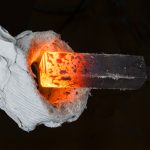How Heat Treatment Affects the Mechanical Properties of Metals
November 30, 2023 10:13 pm Leave your thoughts When it comes to metal work and manufacturing, heat treatment is an essential process that affects the mechanical properties of metals. Heat treatment involves subjecting the metal to specific heating and cooling processes in order to achieve desired characteristics such as hardness, strength, and toughness. In this blog post, we will explore how heat treatment affects the mechanical properties of metals and its importance in various industries.
When it comes to metal work and manufacturing, heat treatment is an essential process that affects the mechanical properties of metals. Heat treatment involves subjecting the metal to specific heating and cooling processes in order to achieve desired characteristics such as hardness, strength, and toughness. In this blog post, we will explore how heat treatment affects the mechanical properties of metals and its importance in various industries.
1. Introduction to Heat Treatment
Heat treatment is a controlled process that alters the microstructure of metals through heating, cooling, or a combination of both. It is typically done to improve mechanical properties such as hardness, strength, ductility, and toughness. The process involves three main stages: heating, soaking (holding the metal at a specific temperature), and cooling. The choice of temperature, heating rate, and cooling method depends on the type of metal and the desired mechanical properties.
2. Changes in Hardness and Strength
One of the key effects of heat treatment on metals is the change in hardness and strength. Heating the metal above its critical temperature allows for the formation of a new crystal structure, which can either increase or decrease hardness and strength depending on the desired outcome. For example, a process called quenching involves rapidly cooling the metal after heating, resulting in a harder and stronger material. On the other hand, tempering involves reheating the metal to a lower temperature, which leads to a reduction in hardness but an increase in toughness.
3. Improvement in Ductility and Toughness
Heat treatment can also significantly impact the ductility and toughness of metals. Ductility refers to a metal’s ability to deform without breaking, while toughness measures its ability to resist fracture and deformation under stress. Depending on the desired properties, specific heat treatment processes can be employed to achieve the desired balance between ductility and toughness. For instance, annealing typically involves slow cooling of the metal, resulting in a more ductile material that is better suited for shaping and forming.
4. Influence on Wear Resistance and Fatigue Strength
Heat treatment can enhance a metal’s wear resistance and fatigue strength, both of which are crucial in applications where the material experiences constant friction and stress. Through heat treatment, the metal’s microstructure can be modified to minimize wear and fatigue damage. For example, through processes like case hardening or surface hardening, a hard and wear-resistant layer can be formed on the surface of the metal while maintaining the toughness of the core. This is highly beneficial in industries such as automotive, aerospace, and manufacturing.
5. Effects on Machinability and Formability
Metal heat treatment can also improve machinability and formability, making it easier to shape and manipulate the material during fabrication processes. Heating the metal to specific temperatures can make it more malleable, allowing for easier cutting, drilling, and shaping. This is particularly important in industries where complex metal components need to be produced with precision, such as in the automotive and aerospace sectors.
6. Importance in Various Industries
Heat treatment plays a critical role in a wide range of industries, including automotive, aerospace, construction, and manufacturing. In the automotive industry, heat-treated metals are utilized in engine components, gears, and transmission systems to withstand high temperatures, pressures, and wear. In the aerospace industry, heat treatment is employed to enhance the strength, fatigue resistance, and corrosion resistance of materials used in aircraft structures and engine components. Similarly, in construction and manufacturing, heat-treated metals are employed to ensure the durability and reliability of structures and equipment.
Summary
Heat treatment is a crucial process that significantly affects the mechanical properties of metals. By carefully manipulating the heating, soaking, and cooling stages, heat treatment can alter the microstructure of metals, leading to changes in hardness, strength, ductility, toughness, wear resistance, and fatigue strength. This process is vital in various industries where metals need to possess specific characteristics to endure demanding conditions. Understanding how heat treatment affects the mechanical properties of metals is essential for producing high-quality materials that meet the requirements of different applications.
Need Steel Fabricators in Hermiston, OR?
NW Metal Fabricators, Inc. is a family-owned business that has been servicing customers in Hermiston, Oregon since 1986. We have more than 100 years of experience in the food-processing industry and specialize in the custom production of storage bins, conveyors, catwalks, handrails, gates, storage tanks, water heater tanks, sanitary piping, steam piping, and trailer truck hitches. NW Metal Fabricators, Inc. is an accredited member of the local Chamber of Commerce. We are a dedicated business where quality always comes first. Our customers know that they can count on us to make sure that their products are hand-crafted to meet their specifications. Contact us today to learn more about what we can do for you!
Categorised in: Heat Treatment
This post was written by admin
